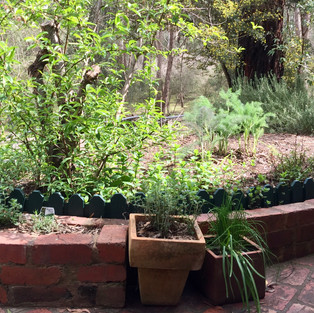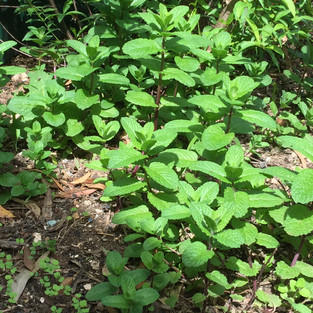"Herbs bypass our thinking, analytical minds and go straight to our hungry souls." Nicki Duffy

Not to be unkind but when I was making those kebabs with my grandchildren I was just a little bit appalled that there were no fresh herbs in my older son's kitchen and maybe not very many in my younger son's - or I should say my daughter-in-law's. To be fair to the latter though, the granddaughters had already gathered their ingredients, and knowing their mother I'm pretty sure she would at least have had some parsley. But in their new house they have a reasonable sized garden and currently no herbs. So get planting kids!
Now I am the world's worst gardener. All of the green thumbs came from my father and went to my sister. I did not get those genes. However, I do seem to be able to grow herbs - well most of them anyway. I will come to which ones I have problems with. After all, basically a lot of herbs are almost weeds. Take a walk in the countryside anywhere in France - and England too - and you will see herbs here and there. Even here in Australia you often see wild fennel. It might not be the kind of fennel that gives you the vegetable but it certainly has fragrant leaves.
I have a small herb garden just outside the kitchen - it needs to be near the kitchen - and in it I currently have, parsley, mint, rosemary, thyme, chives, tarragon, sage, oregano, marjoram, Vietnamese mint, savory, fennel, lemon balm and possible lemon verbena if it comes back after the winter. And there is a lavender bush next door. And a nasturtium plant that sprang up all by itself. Oh and I almost forgot the small bay tree that I have in a large pot around the other side of the house. Which is sort of why I don't use the leaves very much. I just forget it is there.
I shall try again with basil for the summer, but if past experience is any guide I won't get much of that because (a) it will not grow very well and (b) what does grow will get eaten. Snails and slugs love it. Besides you need a lot of it when you do use it for things like pesto. Probably better to stick to the supermarket kind.
The mint is trying to take over the whole garden at one end, so I have to keep digging bits of it up and throwing it out, and at the other end the rosemary bush is gradually encroaching over the whole plot. I really should cut it back, but being such a poor gardener I am reluctant to chop at anything that grows. I found chives growing underneath - well trying to grow underneath.
In my childhood we three children were each given a small patch of ground for our own garden and I think the only things I managed to grow were lavender and some weedy flowers - like the aforesaid nasturtiums. And to tell the truth I don't remember my mother using fresh herbs much - maybe mint and parsley - but then that is probably all she could get. And we wouldn't have thought to use the lavender in cooking. You should. I had the most divine lavender flavoured crème brulée in France once.
"Herbs can be the plants that make you into a gardener, even a very small-scale one, and the ingredients that turn you into a creative cook. They are so easy to grow and so simple to use that they form an irresistible first step on the road to self-sufficiency." Hugh Fearnley-Whittingstall
I am indeed lucky to have the space to grow these beautiful things, but the joy of herbs is that you can just grow a few small pots on your windowsill. Probably the ones that you don't need a lot of - such as sage, thyme, the aforesaid rosemary. Most of the others are easily obtainable in the local supermarket.
But if even growing a very few herbs in pots on your windowsill is too hard, and believe me, I do sympathise, then these days we have no excuse not to use fresh herbs because they are easily available at the supermarket. Coles always has a 2 for $5.00 deal on their sleeves and plastic packets, and I generally have two of the more 'difficult' herbs from there. And I long for the Queen Vic market again. There are whole stalls of herbs there, some of which you have no idea what they are.
I do have parsley in the garden at the moment, but I use a lot of it, and it tends to go to seed very quickly if you don't pick it. Coriander I just cannot grow - it always bolts almost straight away. Ditto for dill. Curry leaves - never seen a curry plant in the nursery. And actually now that I think about it fennel is difficult to get in the supermarket - they don't have it in the sleeves, and the vegetable always has its fronds cut off. So check out the roadsides for that.
One thing I learnt today - well I probably knew on a sub-conscious level - is that the softer herbs - parsley, coriander, basil, dill, fennel, tarragon, oregano should be added towards the end of cooking. Indeed I did learn from Madhur Jaffrey to throw in large quantities of herbs such as coriander, dill and mint right at the end and you get an unbelievably delicious flavour hit.
"Little flourishes, such as parsley, make food seem cared-for. They are as practical as lighting candles to change the atmosphere of a room." Tamar Adler - The Guardian
The woody herbs on the other hand - rosemary, thyme, sage, bay should be used more sparingly and at the beginning of the cooking - leaves only. Well you can put in a whole sprig or two but you will have to fish them out at the end of your cooking.

So what about cooking with them? Well that really needs a whole series of posts. A good place to start might be an article called The 10 best herb recipes in The Guardian, because there were some quite unusual things there, but simple too - like this tea made from lemon verbena, lemon balm, and lavender. I have all these in my garden so if you want to give it a go family just come and get some leaves next time you are allowed to visit.
But basically, experiment. You will find lots of guides to what herb goes with what, but actually they are mostly amazingly versatile, so experiment. Robert Carrier has lots of good general advice here.
"Use herbs and spices imaginatively. These magic powders, leaves, berries and seeds are the secret of fine cooking." Robert Carrier
"Use them sparingly until you have become accustomed to their effects in cooking. It is always easy to add extra seasoning, but it is very difficult to subtract. When trying out a new recipe in which you use herbs and spices, use half-quantities only and then - if you like the flavour - add the rest towards the end of the cooking time." Robert Carrier
"remember, the correct herb or spice combination for any food is the one that tastes right to you. There are no rules. The use of seasoning is an art, not a science." Robert Carrier
See - no rules. But he's not alone. The River Cottage people are all for experimenting too.
"Some herbs are very strong and can be overpowering in large quantities, but it's still hard to completely ruin a meal by adding too much, in the way you could by overdoing the salt or the chilli powder. Herbs invite experimentation, and rarely make you suffer for it." Nicki Duffy
"What I love about herbs is their easiness, the lack of effort they require from the cook. These ingredients don't ask you for any big commitment beyond the bid to make something even more delicious to eat. Preparation is usually minimal: pulling some leaves off a stem, maybe chopping them, maybe not. Quantities need not be precise. One herb can often be substituted for another. ... And yet, while they ask so little of you, herbs will give and give and give in terms of flavour, colour, texture and that indefinable ability they have to just 'make' a dish." Hugh Fearnley-Whittingstall
Yes I know that's a lot of quotations but really they all say it so much better than myself.
Perhaps my own favourite way of showing off herbs is the Persian herb and cheese platter that is served at the beginning of meals in Iran. It's called Sabzi Khordan. It is so, so easy to construct - just sprigs of herbs arranged on a plate, a board or in a dish with some cheese, some bread and maybe some radishes, or cucumber or suchlike. Again - one of those wow things that just blew me away when I first came across it in Claudia Roden's Book of Middle-Eastern Food. Try it some day.
Herbs don't keep for long though once picked or bought and there is lots of advice out there as to how to keep them fresh - some of it complicated, some of it not - like just stick it in a jar of water, which I have found works with some but not others. So use them when you get them. But always have some parsley available. It will perk up just about anything, and if nothing else, make it look prettier.
And if you have herbs that are going a bit over the top, you can often chop up the stalks finely (not the woody ones), and add to your preliminary flavouring, or:
"If you are really feeling a bit overwhelmed by all of your options and are worried about wasting your fresh herbs, just whizz the whole lot (roots and all) in a blender with enough vegetable oil to keep it together. Place in a sterilised jar and leave in the fridge, before inspiration strikes you. (Assuming the jar is tightly sealed, the paste should stay fresh for a few weeks.)" Rachel Kelly - The Guardian
Or to be a little more complicated make a pesto with them.
Yes dried herbs are Ok - indeed sometimes they are a whole new herb on their own - like dried mint, but use less of these, and at the beginning of your cooking. But do try to grow some - perhaps try with mint - it's a weed, and probably should be confined a in a pot (a big one) anyway. It just likes water and a bit of shade.

"Those intense, penetrating aromas send messages directly to the limbic system, the part of our brain that deals with emotion and memory. One thread of scent can cause the mind to retrieve distinct images, but also more fugitive recollections and feelings that can completely alter our mood. A sniff of rosemary or a breath of thyme can awaken powerful associations with comfort, pleasure and satisfaction." Nicki Duffy
That's why so many beautiful perfumes are based on herbs.










Comments